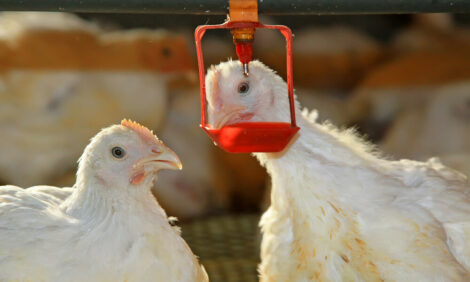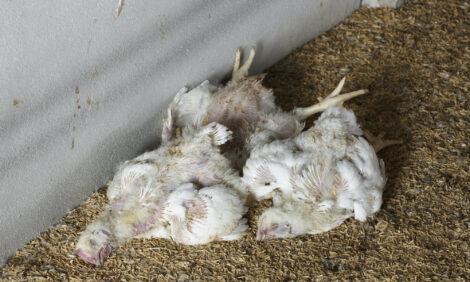



Family Farmers Need Congress to Pass 'Egg Bill' to Survive
US - Egg farmers say they need Congress to include the Egg Products Inspection Act ("Egg Bill"), introduced recently in Congress, as part of this year's Farm Bill or many of them may soon be forced out of business."Most egg farms are family-owned, independent businesses which provide an essential low-cost source of protein to 300 million consumers every day," said Chad Gregory, president of United Egg Producers which represents farmers producing 90 per cent of the eggs in the US. "We desperately need a federal statute that establishes one national standard of egg production because the current myriad state legislation threatens to eliminate interstate egg commerce, destroying our businesses and potentially leading to egg shortages and consumer price spikes in many states," he added. "This would create a major hardship for millions of low- and middle-income consumers."
The largest egg producing states are generally the lowest in population and need to export eggs nationwide; conversely the largest population states are major egg importers. "This patchwork quilt of different state egg production standards could more than double the price of eggs," Mr Gregory said. Already, half-a-dozen states have differing and sometimes conflicting egg production standards. These states include Michigan, Ohio, California, Oregon, Washington and Arizona.
"Egg farmers do not receiveF government subsidies to produce eggs, and the Egg Bill that we support would not incur any government cost, according to a 2012 Congressional Budget Office analysis. The legislation would also have no impact on any other animal agriculture sector, and we see no reason why any other agriculture group should oppose the Egg Bill that is necessary to ensure egg farmers stay in business," Mr Gregory said.
The proposed legislation, S. 820 and H.R. 1731 introduced in both the House and Senate recently, outlines a minimum, national standard for egg production and hen housing in the United States in place of an increasing labyrinth of contradictory state laws. The bill was introduced in the Senate by Sen. Dianne Feinstein, D-Calif.; with Senate Agriculture Committee Chairwoman Debbie Stabenow, D-Mich.; and Sen. Susan Collins, R-Maine; and in the House by Rep. Kurt Schrader, D-Ore; Rep. Jeff Denham, R-Calif; Rep. Sam Farr, D-Calif; Rep. Michael Fitzpatrick, R-Penn; Rep. John Campbell, R-Calif; and Rep. Jared Huffman, D-Calif.
The legislation is nearly identical to last year's bills and will require egg farmers to essentially double the amount of space allotted per hen and make other important animal welfare modifications during a tiered phase-in period during the next 15 to 16 years. The phase-in period allows farmers time to make the investments in these new housing systems, called enriched colony cages, with the assurance that all farmers will be required to face the same requirements by the end of the phase-in period.
Last year's bills included an unusually-diverse coalition of backers in industry, animal welfare, science-based groups and consumer protection, including the UEP, The Humane Society of the US, American Veterinary Medical Association, American Association of Avian Pathologists, Association of Avian Veterinarians, American Society for the Prevention of Cruelty to Animals, Farm Sanctuary, Mercy For Animals, Consumer Federation of America, National Consumers League, and state and regional agricultural and egg producer groups, including the Arkansas Egg Council, Association of California Egg Farmers, Colorado Egg Producers Association, Florida Poultry Association, Georgia Egg Association, Michigan Agri-Business Association, Michigan Allied Poultry Industries, New England Brown Egg Council, North Carolina Egg Association, Ohio Egg Processors Association and Rocky Mountain Farmers Union. Last year's bills were sponsored or co-sponsored by 154 Representatives and 20 Senators.
Polling last year showed that voters overwhelmingly-support such legislation, and the Congressional Budget Office indicated that passage and introduction added no government cost.
"This proposed legislation will help ensure the American consumers continue to have a wide variety and uninterrupted supply of eggs at affordable prices, and that farmers have a level playing field in all 50 states," said David Lathem, a second-generation egg farmer from Georgia who is chairman of the UEP.
The Egg Products Inspection Act Amendments of 2013 would:
- require conventional cages to be replaced during an ample phase-in period with new, enriched colony housing systems that provide each egg-laying hen nearly double the amount of current space;
- require that, after a phase-in period, all egg-laying hens be provided with environmental enrichments such as perches, nesting boxes and scratching areas that allow hens to express natural behaviors;
- require labeling on all egg cartons nationwide to inform consumers of the method used to produce the eggs: "eggs from caged hens," "eggs from hens in enriched cages," "eggs from cage-free hens;" and "eggs from free-range hens";
- prohibit feed- or water-withdrawal molting to extend the laying cycle, a practice already banned by the United Egg Producers Certified program;
- require standards approved by the American Veterinary Medical Association for euthanasia of egg-laying hens;
- prohibit excessive ammonia levels in henhouses except during short periods of adverse weather conditions; and
- prohibit the transport and sale of eggs and egg products nationwide that don't meet these requirements.
If enacted, the proposal would require egg producers to incrementally increase the amount of space hens are given during the next 15 to 16 years. (Phase-in schedules are more rapid in California, consistent with a ballot initiative approved earlier by that state's voters.) Currently, the majority of hens are each provided 67 square inches of space, with up to 40 million receiving about 48 square inches. The proposed phase-in would culminate with a minimum of 124 square inches of space for white hens and 144 for brown hens nationwide.
An economic study conducted by the independent research group Agralytica indicates that the changes are expected to increase consumer prices by less than one penny per egg. This very small increase is much less than natural price fluctuations based on a variety of other factors such as energy, feed and distribution costs.









